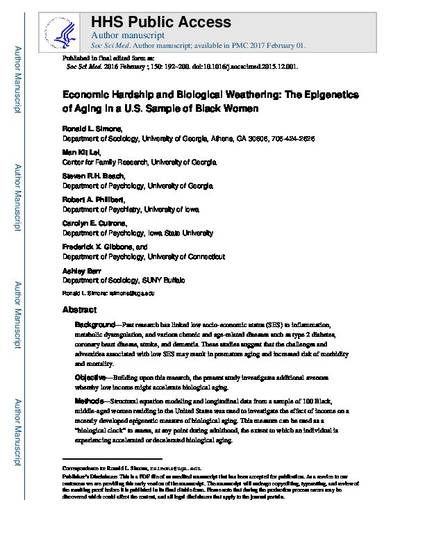
Background—Past research has linked low socio-economic status (SES) to inflammation, metabolic dysregulation, and various chronic and age-related diseases such as type 2 diabetes, coronary heart disease, stroke, and dementia. These studies suggest that the challenges and adversities associated with low SES may result in premature aging and increased risk of morbidity and mortality.
Objective—Building upon this research, the present study investigates additional avenues whereby low income might accelerate biological aging.
Methods—Structural equation modeling and longitudinal data from a sample of 100 Black, middle-aged women residing in the United States was used to investigate the effect of income on a recently developed epigenetic measure of biological aging. This measure can be used as a “biological clock” to assess, at any point during adulthood, the extent to which an individual is experiencing accelerated or decelerated biological aging.
Results—Low income displayed a robust association with accelerated aging that was unaffected after controlling for other SES-related factors such as education, marital status, and childhood adversity. Further, our analyses indicated that the association between income and biological aging was not explained by health-related behaviors such as diet, exercise, smoking, alcohol consumption, or having health insurance. Rather, in large measure, it was financial pressure (difficulty paying bills, buying necessities, or meeting daily expenses) that accounted for the association between low income and accelerated aging.
Conclusions—These findings support the view that chronic financial pressures associated with low income exerts a weathering effect that results in premature aging.
Available at: http://works.bepress.com/carolyn_cutrona/21/

This is a manuscript of an article published as Simons, Ronald L., Man Kit Lei, Steven RH Beach, Robert A. Philibert, Carolyn E. Cutrona, Frederick X. Gibbons, and Ashley Barr. "Economic hardship and biological weathering: the epigenetics of aging in a US sample of black women." Social Science & Medicine 150 (2016): 192-200. doi: 10.1016/j.socscimed.2015.12.001. Posted with permission.